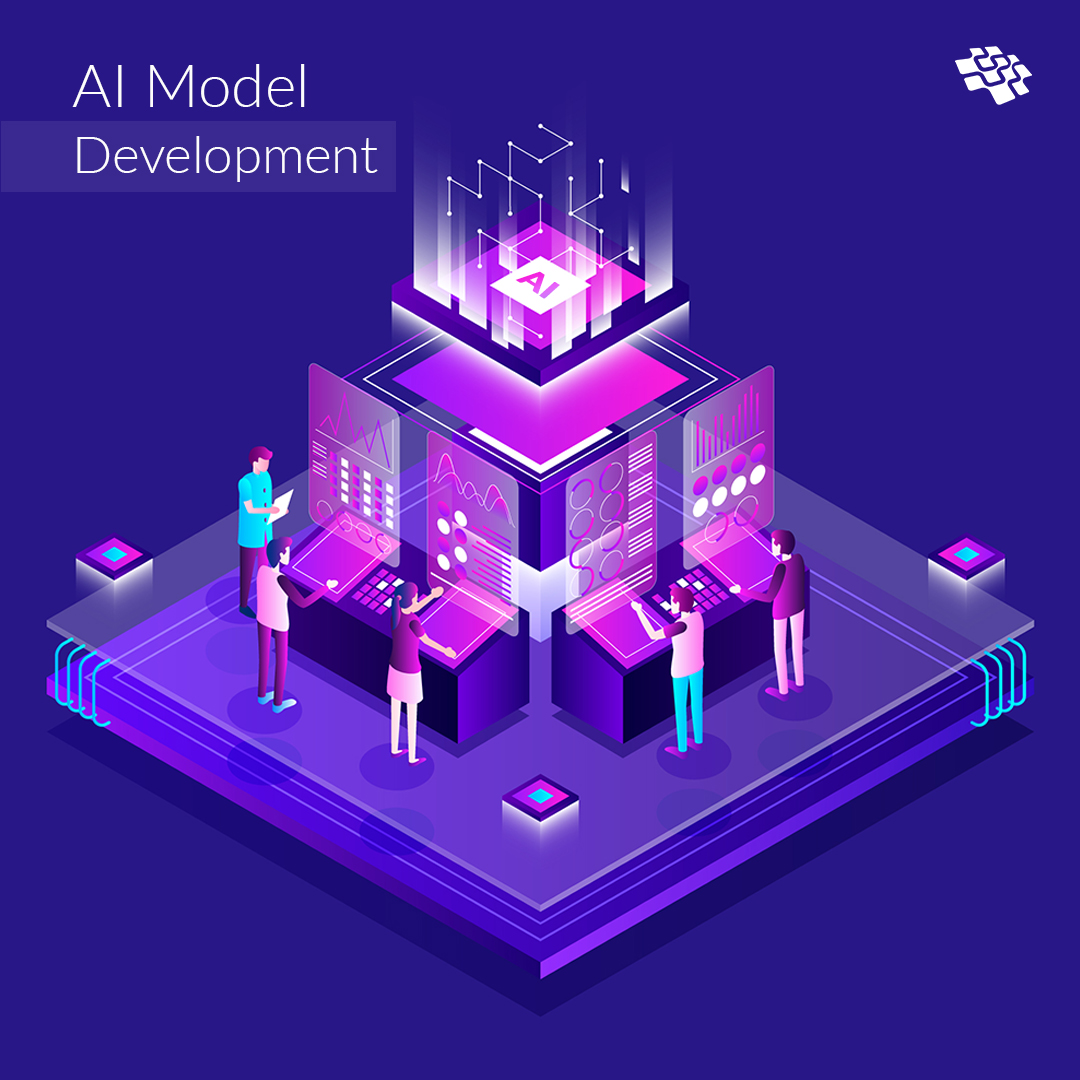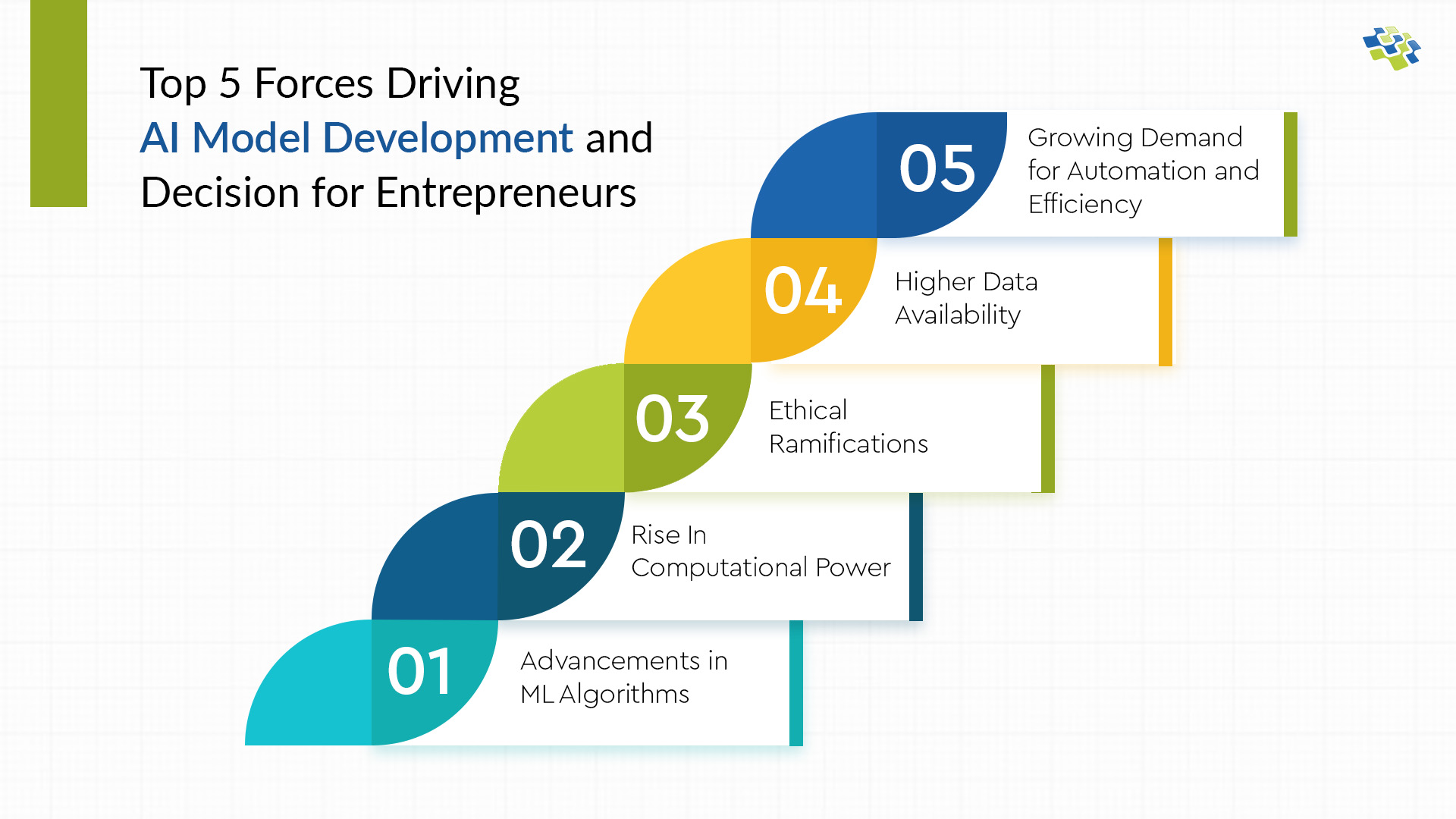Top 5 Forces Driving AI Model Development & Decision for Entrepreneurs
The commercial adoption of AI has been so successful that the market is predicted to grow at an astounding compound annual growth rate (CAGR) of 37%, reaching a value of more than $191 billion by 2024.
The quality of data remains a significant obstacle to the effective use of AI, according to a report by MIT Technology Review, while Gartner estimates that 85% of enterprise AI initiatives will fail to deliver results.

“The recent uptick in the AI model development sphere is driven as much by the easy access to large data as it is by software and technology. By 2025, it is anticipated that the amount of big data produced by the world’s expanding digital economy would exceed 163 trillion gigabytes with an annual growth rate of 40%.”- Statista
Companies like Microsoft, Amazon, Facebook, Apple, Google, and IBM are investing in the innovative work of AI. In any event, 5 forces are propelling the growth of AI and other technologies like Big Data, ML, etc.
AI Model Development: Overview
A program that examines datasets for patterns and predictions is known as an AI Model. AI modeling, the process of creating and applying these models, is most effective when it draws from diverse data sources and mimics human intelligence. Integrating AI models into an organization can help address complex challenges efficiently and cost-effectively.
AI models rely on machine learning, natural language processing, and computer vision to identify distinct patterns. Decision-making algorithms are another way that AI models learn from their training, gather, and analyze data, and finally use what they have learned to accomplish their predetermined goals. There are numerous distinct AI models, and each one operates differently.
Top 5 Forces Driving AI Model Development & Decision for Entrepreneurs
Many factors that are influencing the development of AI models are also influencing the direction that AI-based solutions will go in the future. While making decisions about the creation of AI models, entrepreneurs must take these factors into account. The top five factors influencing the creation of AI models and business decision-making are as follows:
 1. Advancements in ML Algorithms
1. Advancements in ML Algorithms
The advancement of machine learning algorithms is the cornerstone of the development of AI models. Entrepreneurs can leverage these algorithms to create more complex and accurate AI models. Recent advances in machine learning that has enabled AI models to identify patterns and make predictions, include:
- Deep learning,
- Reinforcement learning, and
- Transfer learning
These methods have significantly enhanced the capabilities of AI models, enabling them to become more sophisticated and accurate. By utilizing these innovations in machine learning, entrepreneurs can build effective AI models that can automate tasks, optimize operations, and provide valuable insights for business decision-making.
2. Rise In Computational Power
Developing and utilizing AI models requires substantial computational power. The growing accessibility of computational resources has enabled entrepreneurs to build more advanced AI models capable of processing larger data sets and generating more precise predictions.
With the advent of specialized hardware such as Tensor Processing Units (TPUs) and Graphics Processing Units (GPUs), the development of AI models has been significantly accelerated. These specialized hardware platforms can perform complex computations in parallel, enabling AI models to be trained faster and more efficiently.
This increased computational power has opened new possibilities for entrepreneurs looking to leverage AI in their business operations, allowing them to tackle more complex challenges and make better-informed decisions.
3. Ethical Ramifications
As AI technology becomes more prevalent, concerns over its ethical implications are growing. Improperly developed and trained AI algorithms may perpetuate biases or discriminate against certain groups. In addition to navigating complex regulatory frameworks surrounding liability, intellectual property, and data protection, businesses must also consider the ethical implications of their AI models.
It is crucial to ensure that AI models are transparent, trustworthy, and socially responsible. Companies must take steps to address the potential biases and ethical concerns associated with AI models and ensure that they are used in a fair and unbiased manner. By doing so, businesses can build trust with their customers and stakeholders and avoid potential reputational and legal risks.
4. Higher Data Availability
With the rise of digital technologies, data has become ubiquitous in both society and business. Entrepreneurs can leverage this data to train AI models that can identify patterns, make predictions, and automate tasks. However, to be successful, entrepreneurs must ensure that the data they use is accurate, comprehensive, and unbiased. They must also be aware of any data privacy concerns and comply with data protection regulations.
Data privacy laws vary across different areas, and entrepreneurs must ensure that they are following the appropriate rules and regulations when collecting, storing, and processing data. By taking a responsible approach to data management, entrepreneurs can harness the power of AI while protecting the privacy and security of individuals’ data.
5. Growing Demand for Automation & Efficiency
As businesses grow, there is an increasing demand for AI-based solutions that can automate processes and improve productivity. AI models can be used to:
- Enhance supply chain management,
- Detect fraud, and
- Provide customers with personalized recommendations.
Entrepreneurs who can develop efficient and effective AI models that meet these needs are more likely to succeed in the competitive business landscape. AI can provide valuable insights into complex business processes and help companies make data-driven decisions, leading to increased efficiency and profitability. By leveraging the power of AI, businesses can stay ahead of the curve and remain competitive in today’s fast-paced market.
Further read: Automatic Labelling: A Big Leap in Data Preparation for AI/ML Models
How NextGen Invent Can Help You with AI Model Development
At NextGen, we provide significant technical support to entrepreneurs looking to develop AI models. Some of the ways in which they can help include:
- Data Preparation & Cleansing: Data preparation and cleansing are critical steps in developing an AI model. We can assist in gathering, cleaning, and preparing data for training the model. This involves removing errors, outliers, and missing values from the data. Our developers can also ensure that the data is stored and managed securely and is compliant with data protection laws.
- Model Training & Validation: Once the data is prepared, we can assist in training and validating the AI model. We can also help in selecting the right algorithms and techniques for the model, and ensure that the model is optimized for accuracy, speed, and efficiency.
- Integration with Existing Systems: We can integrate the AI model with existing systems or develop new systems that use the model’s predictions. Our developers also build custom APIs and SDKs that allow easy integration of the model with other applications.
- Maintenance & Support: After the AI model is deployed, we provide ongoing maintenance and support services. We monitor the model’s performance, update the model as needed, and provide technical support to ensure that the model continues to function smoothly.
In summary, at NextGen, we provide valuable technical expertise and support to entrepreneurs looking to develop AI models. Our developers assist in every stage of the development process, from data preparation to model training and integration, and provide ongoing maintenance and support services to ensure that the model continues to function effectively.
Wrapping Up
Entrepreneurs can leverage these factors to create more complex and accurate AI models that can automate tasks, optimize operations, and provide valuable insights for business decision-making. However, they must also ensure that their AI models are transparent, trustworthy, socially responsible, accurate, comprehensive, unbiased, and compliant with data protection regulations.
By taking a responsible approach to AI model development, businesses can harness the power of AI to stay ahead of the curve and remain competitive in today’s fast-paced market while building trust with their customers and stakeholders and avoiding potential reputational and legal risks.
Stay In the Know
Get Latest updates and industry insights every month.
 1. Advancements in ML Algorithms
1. Advancements in ML Algorithms